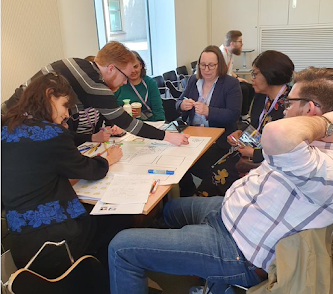I was thrilled to participate in LILAC 2023, hosted by us here at University of Cambridge last week. I relished the opportunity to share all the work Clair Castle and I have put into 'Cartooning the Libraries' over the last few years and we really enjoyed running our workshop on the first day of LILAC: "Cartooning the Library: why and how to use Applied Comics for Information Literacy!". We were oversubscribed but, even with a packed room of 50 participants, we managed to whizz through a little theory before giving everyone a good 40 minutes to think of an IL subject to cartoon in groups of 6-7.
We even had a brief period where everyone could view the amazing Comics participants produced and we managed to get some feedback on our Cartooning Postcards to feed into our research into the impact of using Applied Comics for Information Literacy.
Here are a couple of our favourite outputs - a digital comic by James Clay
I was also absolutely thrilled to be shortlisted for the Ross Todd Journal of Information Literacy Award for my Project Report on Cartooning the Libraries, published in 2021. I did not win the award but I am still honoured to have been considered.
Well done Louise!
It was also great to be giving the award at the Zoology Museum at the networking evening in the shadow of the great whale skeleton, along with an awe-inspiring opportunity to look at the museum after hours and all its fascinating exhibits.
I also enjoyed the rest of the conference as an attendee, where I was inspired by some of the great and wonderful ideas and information literacy teaching that is going on everywhere. There was even a session on how easy it could be to create and broadcast podcasts - great fun but I don't think that will ever be in my skillset. I do think I may listen in to "Copyright Waffle" or other offerings on pedagogy as a development activity.
Generally, the themes of LILAC23 were around critical librarianship, as well as accessibility, diversity, equality and inclusion. We had a great keynote from the young professionals panel looking at how institutional and professional differences in the perceived value of information literacy, perceptions of librarians' teaching roles and how access to training, technology and resources can create barriers to involvement in IL instruction. There was an interesting and wide-ranging discussion about racism, ableism and how other forms of cultural oppression affect our field. Maria King, who is the subject librarian for Health and Social Care at Edinburgh Napier, gave the second keynote presentation and explored how accessiblity affects libraries and education. There was quite a bit of surprise in the room when she explained that we should be using identity-first language e.g. 'autistic person' rather than 'person with autism'. She also talked about the deficit model and the fact that we should not diminish groups with specific needs by emphasising it is good for everyone. I really felt I learned a lot from this keynote.
However, the final keynote on the last day, given by Regina Everitt, was everything a keynote should be - totally inspiring. Regina is Assistant Chief Operating Officer and Director of Library, Archives and Learning Services at University of East London. Her Keynote address was called, "Pivot ponderings: musings about one library's role in supporting tech-enhanced learning." Regina talked us through her experience of navigating the library service through the various Covid pandemic lockdowns we all experienced and she really interrogated the thinking behind online services versus hybrid and dual delivery - and all the pitfalls therein with trying to deliver effective blended learning for a diverse population. It really made me think and reflect about what we all went through with the added experience of dealing with the very particular student population Regina manages, focused on careers-first. There were clearly many differences from my experiences here at Cambridge, but also many points of recognition with the difficulty in navigating this period and an encouragement to reflect on this has and will continue to influence my pedagogical approaches going forward.
All in all there were so many great lectures and workshops and I cannot flag them all but I would like to give a mention to the paper, "The information practices of the homeless" by Andy Lacey, who reported on his qualitative research project with Spires Homeless Centre, London as a site of homeless information practice and information literacy education, based on his MA dissertation at UCL. This paper really made you think about how even learning and getting information can be privilege-laden in our context of HE and how issues such as trust can have a serious impact on what information might be available to you.
In conclusion I had a great time, especially at the conference dinner (great food), in great company and I learned so much about my own IL practice and those of the wider LILAC community. Can't wait for next year.









